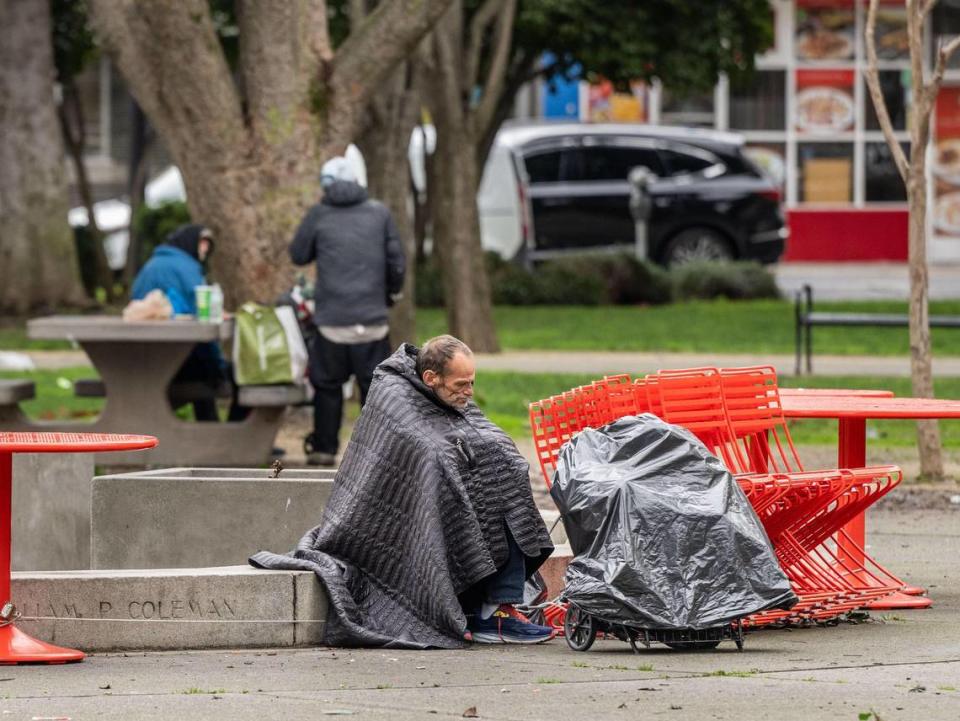A Leo DiCaprio movie shoot displaced homeless people in Sacramento. We can do better | Opinion
- Oops!Something went wrong.Please try again later.
Last week, homeless people were cleared from Cesar Chavez Plaza so that some of Hollywood’s biggest names — including actor Leonardo DiCaprio and director Paul Thomas Anderson — could film their new movie. The budget for the film is $100 million, yet neither the Oscar winners nor their studio, Warner Bros., could be bothered to foot the bill to house people they temporarily displaced.
The city of Sacramento placed “notice to vacate” fliers around the park and green stickers on the remaining tents. As has become common in Sacramento — and other cities across California — law enforcement forced people living in public spaces to leave their location and find shelter elsewhere. The city claims to have offered people in the park relocation to a shelter on Roseville Road, but only a few have accepted.
Opinion
Even if this is the case, relocation tremendously impacts the unhoused, with any move negatively impacting their life. Every time an unhoused individual must relocate, they may not only lose some or all of their possessions, but they also may lose connection to support systems. Communities are built, and people look out for one another.
Beyond a sense of community, organizations that attempt to provide services to the unhoused cannot provide effective and adequate support. Organizations like Sacramento Street Medicine attempt to “provide medical care to people experiencing homelessness.” When unhoused people with medical conditions are moved from one location to another, it means their providers must track them down, which is not always easy and does not always happen. This results in the failure to reach the people who need care the most.
I understand that public areas — like Cesar Chavez Plaza — may sometimes need to make space available for specific uses, and unhoused individuals may need to relocate. But what is most frustrating in this case was that law enforcement performed the actual sweeps for the benefit of wealthy visitors.
Warner Bros. is a multi-billion-dollar company. Leonardo DiCaprio made roughly $30 million in his latest film, “Killers of the Flower Moon.” To think that the parties involved could not pay for short-term lodging for the individuals they displaced seems outrageous. A few nights at a motel, meals, transportation and storage would be just a drop in the bucket for DiCaprio, Anderson and Warner Bros.
DiCaprio, specifically, seems passionate about the current challenges facing our world today. He has been involved in several organizations that focus on environmental issues. And, although these pursuits are admirable, he should realize the consequences his actions have on a local level. He wouldn’t even have to deviate from his overall mission: People experiencing homelessness are often the most impacted by the effects of climate change. The extreme heat and heavy rainfall our region sees consistently directly threaten the health and safety of our most vulnerable.
Like many other Sacramentans, I’m excited to have the film in town. We don’t often see the City of Trees on the silver screen. But the least our visitors could do is offer temporary lodging for the people they are displacing.
A visit from Hollywood A-listers will inevitably require the city to roll out the red carpet. But to make room for that carpet, we shouldn’t be forced to displace our fellow residents from their homes, however temporary they might be. Instead, we should expect our guests to help provide support and extend some graciousness to the community that’s hosting them.
Griff Ryan-Roberts is a law student at the University of the Pacific’s McGeorge School of Law studying legislative and policy issues. He is the chief legislation editor for Volume 56 of the University of the Pacific Law Review.


